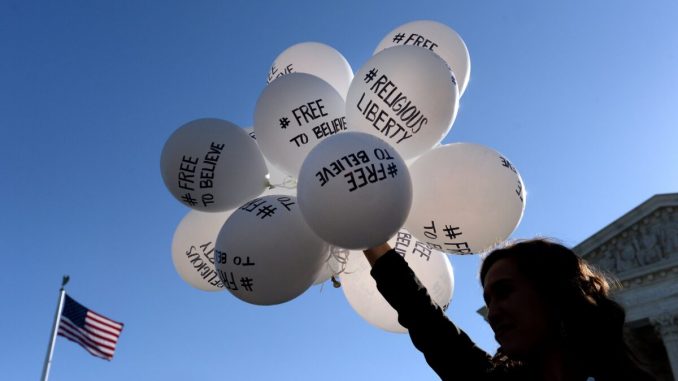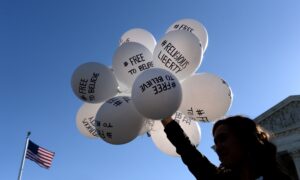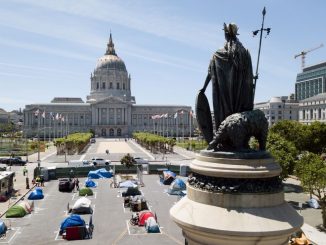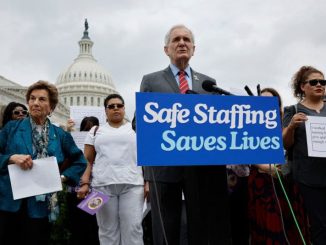

More than two hundred years ago, the Founding Fathers changed the world by imbedding the fundamental human right to religious freedom in the Constitution. That right now hangs by a thread. More precisely, the First Amendment’s “free exercise” of religion clause—that is, the freedom to not just believe but act consistent with one’s faith in the public square—is in dire peril of collapse.
Several cultural and political trends have sparked the current crisis. These include:
We are a Secularizing Culture: Many non-believers do not value religious freedom because they don’t think they have a personal stake in the liberty interest. When the country was highly religious, that wasn’t an issue. But today, faith in America is imploding. For example, according to the Gallup Poll, in 2000, about 70 percent of people were members of a church, synagogue, or mosque. That number has plunged to about 47 percent.
The First Amendment Isn’t What It Used to Be: The free exercise clause was rendered substantially unenforceable in 1990 by the Supreme Court’s ruling in Employment Division v. Smith. The case involved two Native Americans denied unemployment benefits after being fired for ingesting peyote during a religious ceremony. The men sued, claiming they were unconstitutionally punished for participating in a sincerely held Native American religious ceremony. But a 6-3 Court ruled that because the Oregon law in question was one of “general applicability”—meaning it applied to everyone and did not explicitly target the men’s faith—it did not violate their “free exercise” rights.
The Smith case opened the door to oppressing faithful people by simply passing laws of general applicability known to be offensive to people of certain religions. For example, in 2007, Washington promulgated a regulation requiring pharmacies to dispense all legally prescribed medications—an action a federal judge found was aimed specifically at preventing a Christian-owned pharmacy from refusing to distribute the morning after pill because the owners believed it acted as an abortifacient. Despite this—and precisely because the regulation was written generally—the pharmacy owners lost their First Amendment case.
Bipartisan Support for Religious Liberty Has Collapsed: The Smith case sparked a public outcry leading to the creation of a potent left/right political coalition that overwhelmingly passed the Religious Freedom Restoration Act of 1993 (RFRA) through Congress. The RFRA statutorily restored the pre-Smith legal approach to free exercise cases: the government is prohibited from substantially burdening “a person’s exercise of religion” unless it can demonstrate that the law “is in furtherance of a compelling governmental interest.” Even then, the government must demonstrate that it is fulfilling the vital societal purpose in the least restrictive manner practicable.
The RFRA was supposed to solve the Smith problem. But a subsequent Supreme Court case partially overturned the law, allowing it to remain in effect at the federal level but invalidating it as applied to the states.
The left/right coalition that had passed the RFRA regathered to craft a curative that would legally reinstate the RFRA’s approach at the state level. The resulting Religious Liberty Protection Act of 1999 (RLPA) passed the House of Representatives easily. But then, the bottom fell out.
What had changed? The ascendency of the gay rights movement. Its leaders believed that religious freedom would become the pretext for discrimination. The left bolted the alliance and the RLPA died in the Senate—in large part due to the efforts of Senator and future President Joe Biden.
Now, the Left Wants to Destroy the RFRA: Where left once agreed that the RFRA was essential to furthering social comity, it now views the law as an excuse for bigotry in need of immediate remediation. So, apparently, does President Biden who enthusiastically supports Democrat-sponsored bills that would eliminate the RFRA—that he voted for—as an effective protection of religious liberty.
The Equality Act would add sexual orientation, sexual identity, and pregnancy to the classes protected under the Civil Rights Act of 1964. It would also explicitly gut the RFRA by banning its use as “a defense” to a claim of discrimination “or provide a basis for challenging the application or enforcement” of the law.
Among other consequences, passage of the Equality Act could result in Catholic hospitals being forced to permit sterilization, contraception, abortion, and transgender hysterectomies on premises—despite these being prohibited by Catholic moral teaching. The Equality Act has passed the House of Representatives and is awaiting action in the Senate.
The Do No Harm Act would gut the RFRA in most circumstances in which it would apply. The bill specifically states that the RFRA should not “authorize an exemption from generally applicable law if the exemption would impose the religious views, habits, or practices of one party upon another.” That would pretty much apply across the board. The practical impact would be to eviscerate medical conscience rights and moot previously decided RFRA religious liberty cases like Hobby Lobby.
And with that, freedom of religion would shrivel to a mere “freedom of worship,” that is, we would have the right believe whatever we want inside the walls of a house of worship or our homes. But we would not necessarily be free to act consistently with those beliefs in the way we live our public lives. What a hollow “freedom” that would be.
And here’s the thing: If America’s “first liberty” can be so casually thrown away, so too could any other American freedom. Religious or secular, liberal or conservative, gay, straight, or transgendered, that means we all have an essential stake in preserving freedom of religion, even when it is inconvenient or cuts against the cultural grain. Because once one fundamental freedom is “disappeared,” others will surely follow.
Award winning author Wesley J. Smith, is chairman of the Discovery Institute’s Center on Human Exceptionalism.
Views expressed in this article are the opinions of the author and do not necessarily reflect the views of The Epoch Times.





Be the first to comment